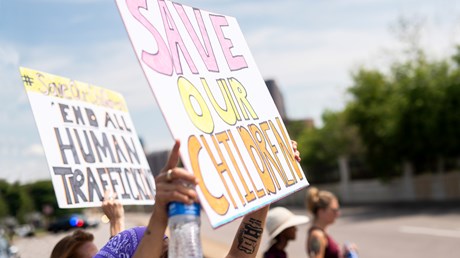Online myths and misinformation are becoming more of a distraction from their work.

When Alia Dewees conducts seminars about the scourge of sex trafficking and its prevention, there’s one group of people more likely than others to quiz her about the furniture and décor company Wayfair selling missing children or kids being smuggled through tunnels under New York City: Christians.
These stories are among the conspiracies that were popularized by the QAnon movement and have captured the imaginations of countless Americans and more than a quarter of Christians.
What myth-believing Christians don’t want to hear is Dewees’s experience as a trafficking survivor. When her experiences don’t match what they’ve read on the internet, some trust the internet rather than the survivor in front of them.
“My voice is invalidated; my experience is invalidated,” said Dewees, who now works as the after care development director for Safe House Project, an anti-trafficking organization based in Alexandria, Virginia. “That was so true for me in my trafficking experience for so many years that it’s a triggering experience. It triggers a trauma response of feeling like I want to shut down.”
January is National Slavery and Human Trafficking Prevention Month, and anti-trafficking groups are struggling to combat not just an international multibillion-dollar industry but also misinformation that distracts from real survivors.
Anti-trafficking advocates have always encountered misconceptions, often formed from media portrayals of trafficking like the film Taken. It’s common for people who know nothing about trafficking to assume traffickers work by kidnapping unsuspecting victims off the street. And Dewees said that most people will abandon their misconceptions when ...
from Christianity Today Magazine
Umn ministry




.gif)

.gif)
.gif)
